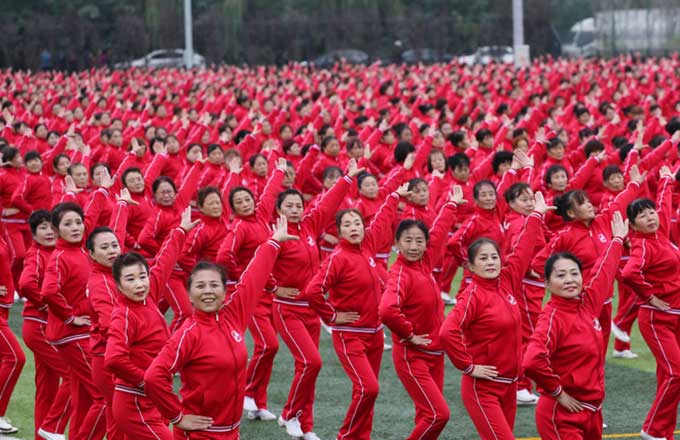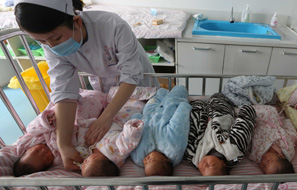China to reform income distribution
BEIJING - China on Tuesday unveiled guidelines to reform its income distribution mechanisms amid growing public concern over a widening wealth gap.
The reform will focus on increasing residents' income, narrowing the income distribution disparity and regulating the distribution order, said a statement from the State Council, or China's cabinet, which declared approval and transfer of the guidelines.
The government will work to double the average real income of urban and rural residents by 2020 from the 2010 level and let the poor enjoy faster income growth, according to the guidelines.
The middle-income group will be expanded and the number of those living under the poverty line will be sharply reduced, while excessively high and hidden income will be adjusted and regulated, they said.
The reform also targets raising the proportion of residents' income in the overall national income and spending more government funds on social security and employment.
"Both efficiency and fairness should be considered in the initial distribution and redistribution processes," the State Council said.
It hailed the reform as significant to the country's bid to transform the pattern of its economic development into one that is more consumption-driven.
Fairer income distribution is a fundamental move to safeguard equity and justice as well as social stability and harmony, it said.
However, "deepening the income distribution reform is a systematic project that is arduous and complicated and concerns the reallocation of various interests," said the cabinet. "There is no way to accomplish it overnight."
A task force was set up in October 2010 to study income distribution reforms, involving experts from the National Development and Reform Commission, the Ministry of Finance and the Ministry of Human Resources and Social Security.
The State Council urged local governments and various departments to map out supporting schemes and detailed rules for implementation of the guidelines.
As China's economy catapulted to the world's No. 2 position, the country also saw its income gap yawning.
The Gini coefficient, a rich-poor index, reached 0.474 in China in 2012, higher than the warning level of 0.4 set by the United Nations, said the National Bureau of Statistics, with the news marking the first time China announced an official broad-based Gini coefficient since 2000.
Both central authorities and economists have urged accelerated reforms of the income distribution system to bridge the wealth gap for more sustainable development.
China will work to boost national incomes, deepen reforms on the income distribution system and enable people to share the country's development achievements, according to a keynote report delivered at the 18th National Congress of the Communist Party of China.
Boost residents' income
Tuesday's guidelines offer directions on an extensive range of policy areas such as taxation, subsidies, salary system, financial regulation, household registration and social security.
The guidelines set a target of reducing the number of people living below the poverty line of 2,300 yuan (366 U.S. dollars) in per capita annual net income at constant 2010 prices by around 80 million as of 2015.
That will be a drastic fall from about 128 million in rural areas who were defined as poor in 2011.
A long-term mechanism to promote farmers' income will be established, according to the guidelines.
Farmers will be guaranteed proceeds from transferring their contracted land plots and collect higher revenues from gains in the land value.
Rural migrant workers will be helped get registered as urban residents and benefit from all basic public services in cities.
The government will also try to make farming more profitable by industrializing agricultural production and continuing to increase the minimum purchase prices of major grain products.
In other efforts to swell ordinary resident's pockets, China will promote fairer employment, raise grass-roots civil servants' salaries, cut the tax burden for small firms and demand more listed companies pay dividends to individual investors, the guidelines said.
According to the guidelines, reforms will be advanced to make banks' interest rates priced by the market and free to move in a wider range so as to protect the interests of Chinese depositors.
The government will expand the proportion of expenditure on social security and employment promotion in the total fiscal outlays by about 2 percentage points by 2015 from 2011, according to the
Adjust the high
Meanwhile, the country is aiming at officials, state-owned enterprises (SOE) and wealthy individuals in its bid to strengthen regulation of the high-income group.
Rules that demand government officials report their income, real estate assets, investment and family members' jobs will be implemented more strictly, the guidelines said.
SOEs must impose ceilings on payments to their senior management who are appointed by the state and make sure senior staff's salary growth is slower than the average level for general employees.
The percentage of profits that central SOEs have to hand in to the government will be increased by around 5 percentage points by 2015 from the current level and the added income will go to social security.
The guidelines also proposed keeping the staff scale of central and local governments from growing in the 2011-2015 period and rigorously controlling government spending on receptions, car purchases and driving as well as overseas tours.
To tax the rich more, the government will expand experimental property taxes gradually, collect consumption taxes on more high-end entertainment activities and luxury products, and study imposing inheritance taxes "at an appropriate time."
In the meantime, foreign individuals will no longer be exempt from personal income taxes on stock dividends and bonuses they obtain from foreign-funded enterprises in China, according to the guidelines.


























